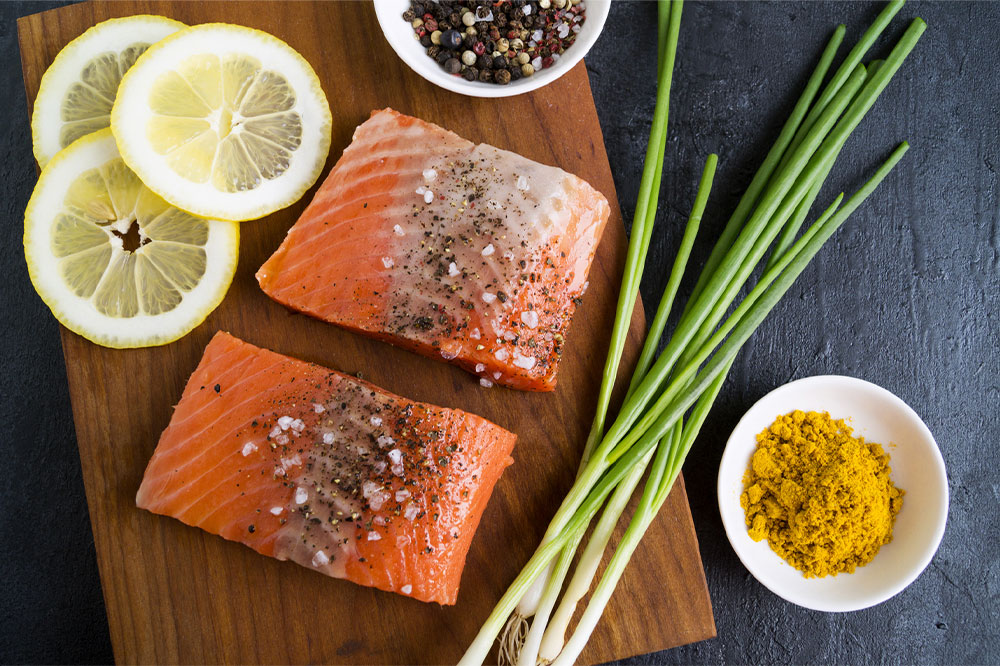10 Foods To Eat for a Healthy Heart

Heart disease is fairly common in the country, and the importance of maximizing heart health cannot be overstated. Exercising regularly, making good lifestyle choices, and above all, eating right are some ways to reduce the risk of cardiovascular disease. There are some foods that have a wealth of nutrition and they also ultimately help lower cholesterol and promote heart health. Adding these to your daily meals is the first step forward.
Salmon
Salmon is a potent source of omega-3 fatty acids, which help to reduce inflammation and promote cardiovascular health. Salmon is also a good source of protein and other nutrients. It can be cooked in a variety of ways, making it a versatile option for meals. Fish, in general, is a lean protein source and is low in saturated fat. Adding fish to your meals at least two times a week can help reduce the risk of developing a cardiac disease. Some of the best fish for heart health apart from salmon are mackerel, herring, and sardines.
Olive oil
This versatile oil is rich in flavor and can be used to cook, roast, bake, fry, and can even be used for salad dressing. Packed with antioxidants, healthy fats, and anti-inflammatory properties, olive oil is a heart-healthy food that can help to lower cholesterol and blood pressure.
Avocados and other berries
This luscious, buttery fruit, which is technically a large berry, is a good source of monounsaturated fats, fiber, vitamins, and minerals. Avocados can be eaten as a fruit, added to salads, dips, and even with sandwiches. Other berries, especially dark berries like blueberries, blackberries, and raspberries, are high in antioxidants and help to protect your cells from damage. They are also a good source of fiber, which can help to lower cholesterol levels. In addition, berries contain flavonoids, which have been shown to reduce the risk of cardiac diseases. They also improve blood sugar levels when eaten fresh.
Nuts and seeds
Nuts and seeds make for a great snack and are quite delicious when roasted, added to salads and trail mix, or even eaten plain. They are a good source of protein, healthy fats, fiber, vitamins and minerals and can help to improve cholesterol levels and lower blood pressure. As a rich source of unsaturated fats, which help improve blood circulation, nuts should be a go-to option for a quick snack. Some of the best nuts and seeds for cardiovascular health include almonds, walnuts, flaxseeds, and chia seeds. However, watch your portion sizes, as nuts and seeds are high in calories.
Beans
Beans are packed with soluble fiber, which can help to lower cholesterol levels. They also contain protein and various vitamins and minerals. Beans can be cooked in different ways. They can be used as a side dish or added to soups, salads, and main course. Those with high cholesterol must include beans in their daily meals to improve cholesterol levels and reduce the risk of cardiovascular disease.
Dark chocolate
Made from cacao beans, which are packed with antioxidants like flavonoids that are good for heart health, dark chocolate is less sweeter than other types of chocolate. It has less sugar compared to milk chocolate and white chocolate, making it a healthier option. When choosing dark chocolate, look for a bar that has at least 70% cacao and no milk solids.
Tomatoes
Tomatoes are packed with lycopene, which is a natural plant pigment that has antioxidant properties. Low levels of lycopene in the blood are connected to an increased risk of cardiovascular disease and stroke. Including tomatoes in your daily meals can help manage cholesterol and blood pressure.
Garlic
Known for its beneficial properties, garlic is an important part of cuisines across the globe. While it makes a great addition to your food, it can also help improve cardiovascular health. It contains a compound called allicin, which gives it healing properties and helps lower cholesterol and blood pressure.
Leafy greens
Not only are leafy greens low in calories but they’re also chock full of nutrients like vitamins A, C, E, K, and magnesium. Dark leafy greens particularly are packed with vitamin B9 or folate, which helps prevent cardiovascular disease. Spinach, kale, lettuce, and collard greens are some of the most nurturing greens and can be versatile in the preparation of various foods.
Green tea
The wholesomeness of a good cup of green tea cannot be overstated. Green tea contains polyphenols and catechins that work as antioxidants to reduce inflammation, protect the heart, and prevent cell damage.
Heart-healthy foods are typically free of trans fats, low in sodium, cholesterol, and saturated fats, and are high in fiber, vitamins, minerals, and antioxidants. This does not mean that food alone can prevent the risk of cardiovascular disease, but eating right goes a long way. Moreover, when it comes to keeping your heart healthy, what you eat is just as important as how much you exercise and remain active. So, incorporating these foods into your daily meals and ensuring at least 30 minutes of regular exercise can help keep your heart healthy and improve your overall health at the same time.






